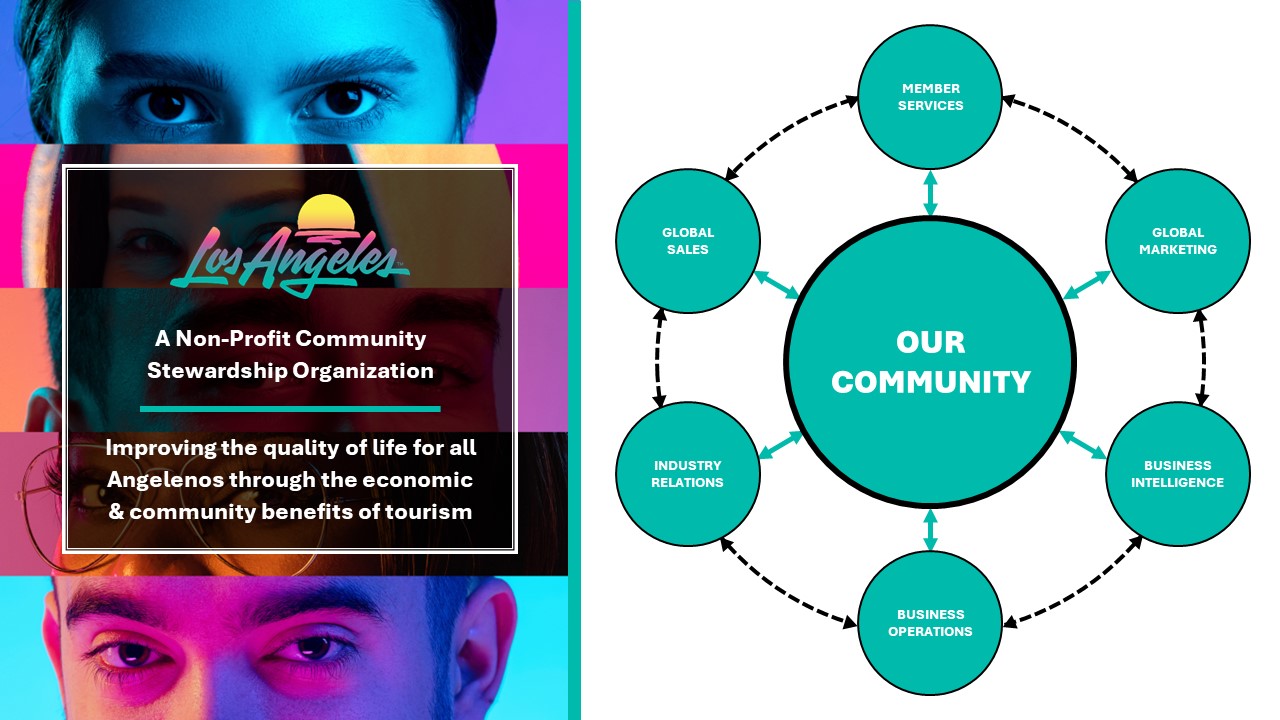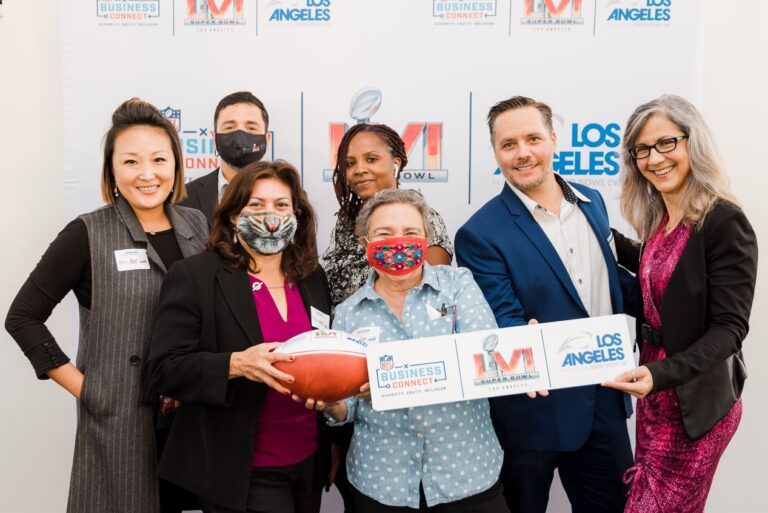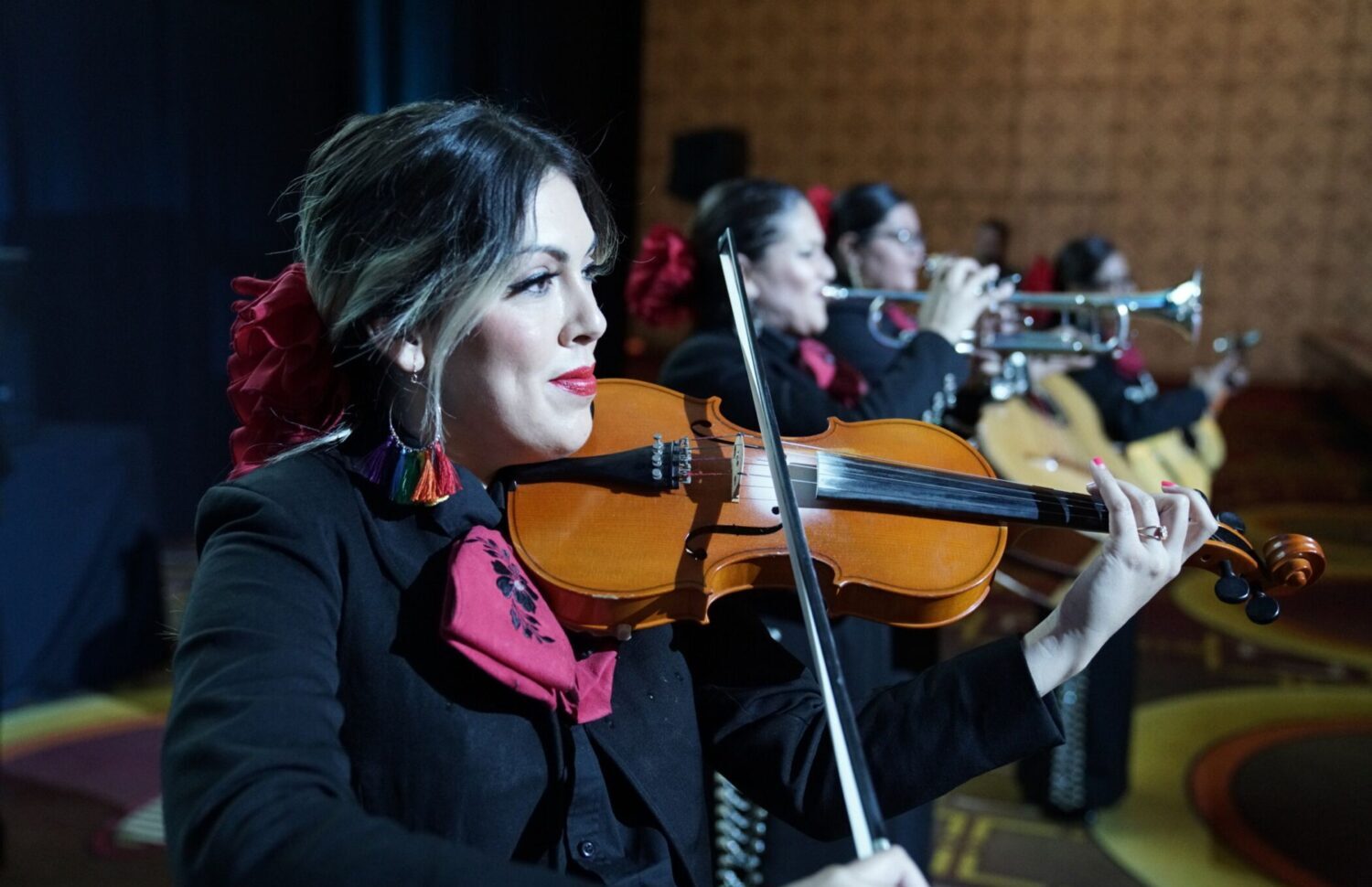Destination Stewardship Report – Volume 5, Issue 1
This post is from the Destination Stewardship Report, a publication that provides practical information and insights useful to anyone whose work or interests involve improving destination stewardship in a post-pandemic world.

The Griffith Observatory, overlooking an illuminated Los Angeles city skyline. [Photo by Adam Burke]
The Los Angeles DMO Adopts Destination Stewardship
When a major city DMO starts getting hints that the old style of simply marketing major attractions isn’t quite satisfactory, some soul-searching ensues. Los Angeles Tourism CEO Adam Burke explains why they had to change, and how they did it. A key step: Change the bylaws.
To build an equitable, sustainable future, Los Angeles Tourism recasts itself a “destination stewardship organization”
When the team at the Destination Stewardship Center asked if I could share some of the work we’re doing in Los Angeles around equity and sustainability, I was somewhat reluctant since there is exceptional work being done by numerous DMOs around the world. There is no shortage of good ideas and best practices and, at Los Angeles Tourism, we’re learning in real-time alongside our colleagues.
That said, after over 30 years in the industry, I remain as passionate as ever about the transformational power of travel and tourism. As Mark Twain famously observed, “Travel is fatal to prejudice, bigotry, and narrow-mindedness.” By exploring other cultures and traditions, we see the world through a broader lens and realize that we have far more in common through our shared humanity than what divides us. In an increasingly polarized world, travel remains among the most effective forms of soft diplomacy – something that has never been more important.
Within that context – and recognizing that I am regularly inspired by the work of countless individuals and organizations across our industry – I humbly offer some insights into our journey at Los Angeles Tourism from being a traditional Destination Marketing Organization to transforming into a true Destination Stewardship Organization.
Background
As with all DMOs, the global pandemic forced us to step back and fundamentally reevaluate our business model. During that process, I was reminded of noted author Simon Sinek’s exhortation to “Start With Why.” While our business may be travel and tourism, we realized our mission statement was focused more on WHAT we did than WHY we did it. Absent that foundational understanding, we believed that we lacked a core operating belief that could lend strategic clarity to our efforts.
In reexamining our “why,” many of the answers presented themselves in multiple iterations of the DestinationNEXT Futures Study. Developed jointly by Destinations International and MMGY NextFactor, this pivotal research provides ongoing insights into the highly dynamic, constantly evolving relationship between tourism and the communities we serve. In reviewing the last several DestinationNEXT studies, we landed on three essential truths that informed our thinking:
(1) What’s good for residents is also good for tourism – but the opposite does not always hold true. In fact, there are countless examples worldwide in which the unchecked growth of visitation has had significant negative impacts on communities. This, of course, gave rise to the notion of “overtourism.”
(2) Destination development must align around economic, social, and environmental sustainability. Gone are the days when the only essential Key Performance Indicators (KPIs) revolved around total visitation and direct visitor spending. While these metrics remain critically important, they must now be consistently viewed alongside considerations of equity, inclusion, and sustainability.
(3) Long-term success requires a shared vision for the future that is developed through a collaborative, iterative process. Given the above considerations, tourism must be viewed as something that is done FOR and not TO our communities, requiring ongoing engagement with a broader range of external stakeholders than ever before.

Los Angeles’ Destination Stewardship model places the community at the center of everything they do. [Photo courtesy of Adam Burke]
Defining Our Why
Based on these insights, we realized that we needed to evolve into a “community-centric” organization – one where the needs of residents are viewed as foundational to our work. Through that lens, we also recognized that we have an incredibly powerful platform to elevate historically disadvantaged communities in a profoundly meaningful way. Finally, DestinationNext’s findings made it clear that we needed to put greater emphasis on how tourism impacts communities across Los Angeles.
Taking Simon Sinek’s cue, we sought to articulate a mission statement that encapsulated these core beliefs. These efforts yielded one simple (yet complex) concept that defines our “why” and serves as our fundamental guiding principle:
Improve the quality of life for all Angelenos through the economic and community benefits of tourism.
Dissecting this statement, it represents the three core concepts described above:
(1) “Improve the quality of life” – Just as the first tenet of the Hippocratic Oath is, “First, do no harm,” this speaks to the need to ensure that tourism consistently yields net positive impacts for our community.
(2) “For all Angelenos” – While Los Angeles remains one of the world’s most diverse communities, noted DEIA strategist Arthur Chan sagely advises us that, “Diversity is a fact. Equity is a choice. Inclusion is an action. Belonging is an outcome.” For us to truly fulfill our mission, we must ensure that our efforts serve the needs of those who have historically not had equitable access to opportunity.
(3) “Economic and community benefits” – Beyond all the things that residents are able to enjoy that were wholly or partially funded and developed to serve visitors – from local hotels, restaurants, and attractions – we have the opportunity to serve as a catalyst for workforce development, elevating small businesses, and even helping to address the needs of those experiencing homelessness.
Of paramount importance, it is essential to recognize that there is no “finish line” to destination stewardship. Rather, it is a foundational change in how we do business – one in which the guiding principles of our mission statement must be interwoven into the very fabric of what we do. It should not be seen as “one more thing to do” but, instead, become the lens through which we view every business decision.
Joining the Global Community

LA Tourism’s approach includes engagement at the global, national, and state level. [Photo courtesy of Adam Burke]
Unfortunately, the SDGs remain far less known in the United States, and since global problems require global solutions, we believe that the U.S. travel and tourism industry must join our colleagues around the world in adopting this framework. That said, we also recognize that no single organization can effectively address all 17 SDGs.

LA Tourism’s focus areas hone in on SDGs 8, 10, 11, and 17. [Photo courtesy of Adam Burke]
In addition, we completed GSTC’s comprehensive destination assessment, which provided an in-depth analysis of where our community is excelling and where there are opportunities for improvement. This process was particularly helpful since it required close collaboration with a wide range of stakeholders including industry members, community leaders, and city officials. The resulting “gap analysis” has proven invaluable in providing strategic clarity and a disciplined focus for our efforts.
Putting Words Into Action
As we transitioned from a traditional DMO to a true Destination Stewardship Organization, we recognized that – to create a sense of shared urgency and accountability – we had to develop substantive, meaningful goals that were fully integrated into our annual Strategic Plan and directly tied to team member compensation. Absent this level of focus – and based on key learnings from other industry colleagues – it was clear that initiatives around equity and sustainability have historically ebbed and flowed in favor of pursuing those objectives that were formally included in an organization’s business plan.
While only scratching the surface, the following represent several tangible examples of how Los Angeles Tourism has pursued our mission with intentionality and a sense of purpose. And, as noted above, it’s important to recognize that exceptional work is being done by DMOs across the industry and we learn from their work every day.
Board Governance – The Starting Point
As a 501(c)6 membership-based, non-profit organization, our work is directly overseen by the Los Angeles Tourism Board of Directors, who generously volunteer their time and talents in support of our mission. As our primary governing body, we believed that the composition of our Board should reflect the incredibly rich diversity of our community – not on a performative basis, but because we passionately believe that hearing from a broad cross-section of Angelenos gives us access to a much wider range of perspectives, ideas, and lived experiences. That has been borne out by numerous studies showing that diverse teams consistently outperform homogenous ones and that inclusive teams outperform those organizations that are simply diverse.
Historically, since 90% of the organization’s funding comes through taxes and assessments paid by hotel guests, our bylaws required that 51% of our Directors had to be hotel general managers or owners. While the hotel industry is making conscious efforts to address the issue, we had to acknowledge that this requirement impeded creating a truly diverse and inclusive Board, since the demographics of hotel executives do not currently reflect the diversity of our community.
Working with our Governance and Nominating Committees, we amended our bylaws to require that any formal action of Board Governance require a 2/3 majority vote, rather than the simple 51% majority requirement that had been in place since the organization’s founding. As a result, and in collaboration with our local hotel community, the number of Board seats for hotel general managers and owners was reduced by 30%, enabling us to increase the number of female directors by 58% and diverse Board members by 100%.
Elevating Small, Diverse-Owned Businesses

Bikes and Hikes is a local and diverse outdoor tour company which has become incredibly popular for visitors. [Photo courtesy of Adam Burke]
First, the vast majority of these businesses didn’t think of tourism as a potential means of growing their revenues. In addition, many weren’t familiar with our organization or the resources available to support their companies. Finally, community leaders provided the critical insight that – while the City of Los Angeles has made significant strides in this area – most small, diverse business owners did not believe that they were likely to be selected through a competitive RFP process. As a result, we identified a significant need and opportunity to engage directly with these underserved organizations.

Business Connect at Super Bowl LVI. [Photo courtesy of Adam Burke]
Through those efforts, we onboarded over 140 new diverse-owned businesses. As we began working more closely with these Members, we recognized the need to help these companies better understand our industry and build long-term capacity to attract both leisure and group business. To enable this process, we subsequently waived Membership dues for a second year and collaborated with the Cultural Heritage Economic Alliance (CHEA) to provide formal “Tourism Readiness” training for these small businesses.
Paid Apprenticeships – Rebuilding Our Talent Pipeline
One of the most frequently discussed topics over the last 24 months has been our industry’s urgent need to attract a new generation of talent. As has been cited by numerous sources, younger generations no longer see travel and tourism as an employer of choice. Two of the primary reasons identified include a lack of awareness regarding the breadth and depth of our industry and the belief that there is insufficient opportunity for upward mobility – particularly for communities of color.

The first all-female mariachi band in Los Angeles. [Photo courtesy of Adam Burke]
First, these students are unable to take advantage of unpaid internships since many are already working full-time jobs while pursuing their education. Second, our industry has historically focused its efforts on four-year degree institutions with formal hospitality programs, thereby excluding a wide range of diverse candidates from consideration. Finally, as we developed the program curriculum, it became clear that we needed to provide hands-on experiences to help students better understand the full spectrum of tourism-related careers available to them.
As a result, we launched a 2024 pilot program in which six local travel and tourism organizations agreed to host a full-time, paid apprentice for one year with the objective of securing long-term career opportunities for all apprentices at the conclusion of the program. Los Angeles Tourism is grateful to have hired two apprentices for year one, both of whom are working within our Membership team to give them the broadest possible exposure to every aspect of our local tourism community. In addition, the apprentices will be participating in a series of one-day immersion programs with a variety of our partners, giving them an in-depth, behind-the-scenes understanding of arts & cultural institutions, sports & entertainment venues, event planning & catering companies, and theme parks & attractions.
The Road Ahead
As the philosopher Lao Tzu once said, “The journey of a thousand miles begins with a single step.” While we are grateful to everyone involved in the steps we’ve already taken, we recognize that becoming a Destination Stewardship Organization is truly a lifetime commitment – that this vital work must outlive us and serve as the legacy that permanently transforms the nature of our work.
Similar to the Mark Twain quote cited above, I am reminded of St. Augustine’s poignant observation in the 5th Century that, “The world is a book, and those who do not travel read only one page.” I look forward to collectively writing the next chapter of our industry’s story with all of you, and to leaving the world a better place than we found it.
About the Author
Adam Burke, President & CEO of Los Angeles Tourism & Convention Board (Los Angeles Tourism).




